Abstract
Cleft lip or palate or both is one of the common congenital conditions in Ontario; its incidence is 1.2 to 1.6 per 1000 live births. A review of the records of 358 patients showed that 40%, particularly those with a severe defect, had other medical problems. This condition can affect the children and their families in many ways. In early life many patients undergo surgical repair and have speech, hearing and dental problems; during adolescence they may have cosmetic, orthodontic and emotional problems. Many parents are concerned about the genetic implications of the defect. This variety of problems requires management by several health care disciplines. Many Canadian health sciences centres offer multidisciplinary team management in a cleft palate clinic. The child's primary care physician, with whom the team exchanges information, plays a significant role in helping the child and the family function optimally.
Full text
PDF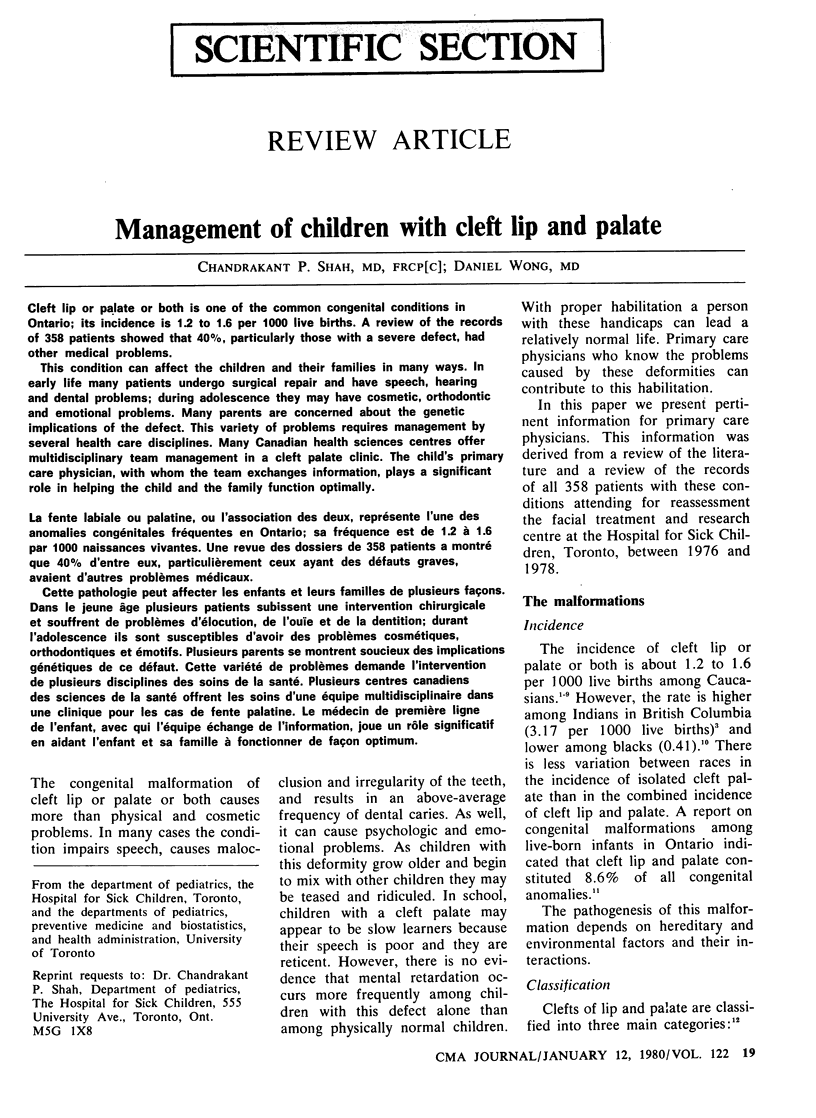
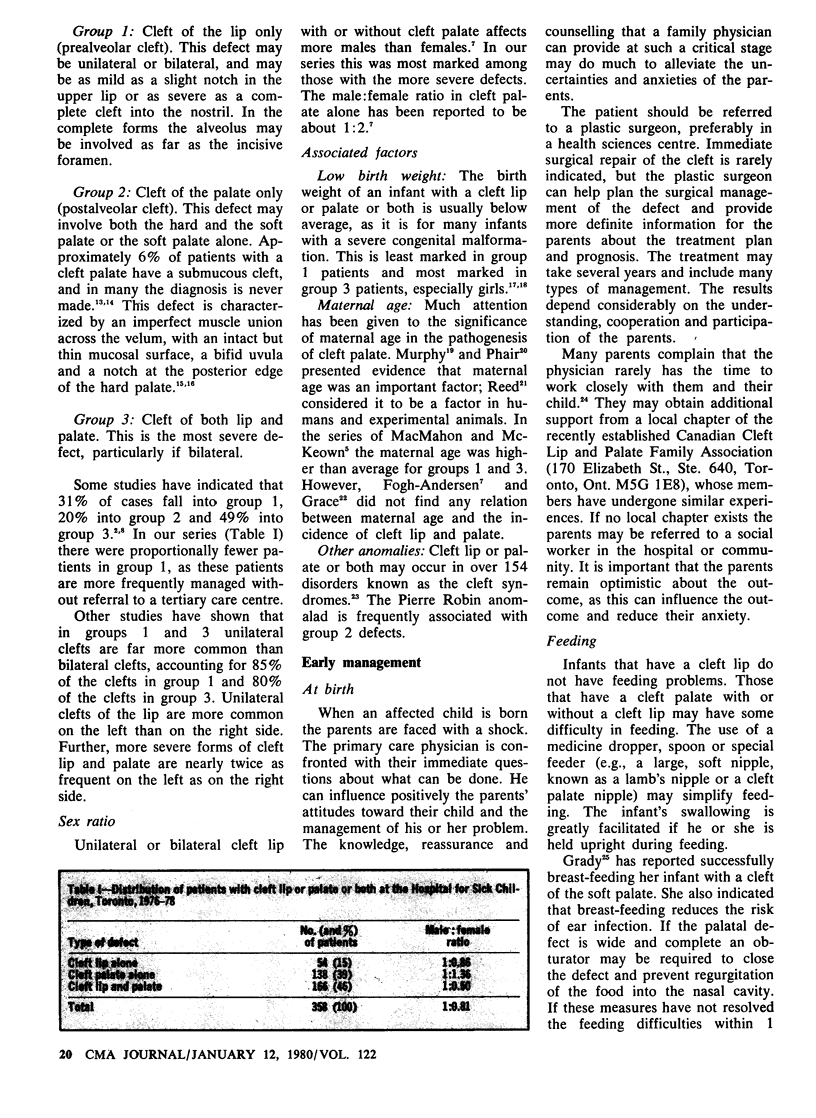
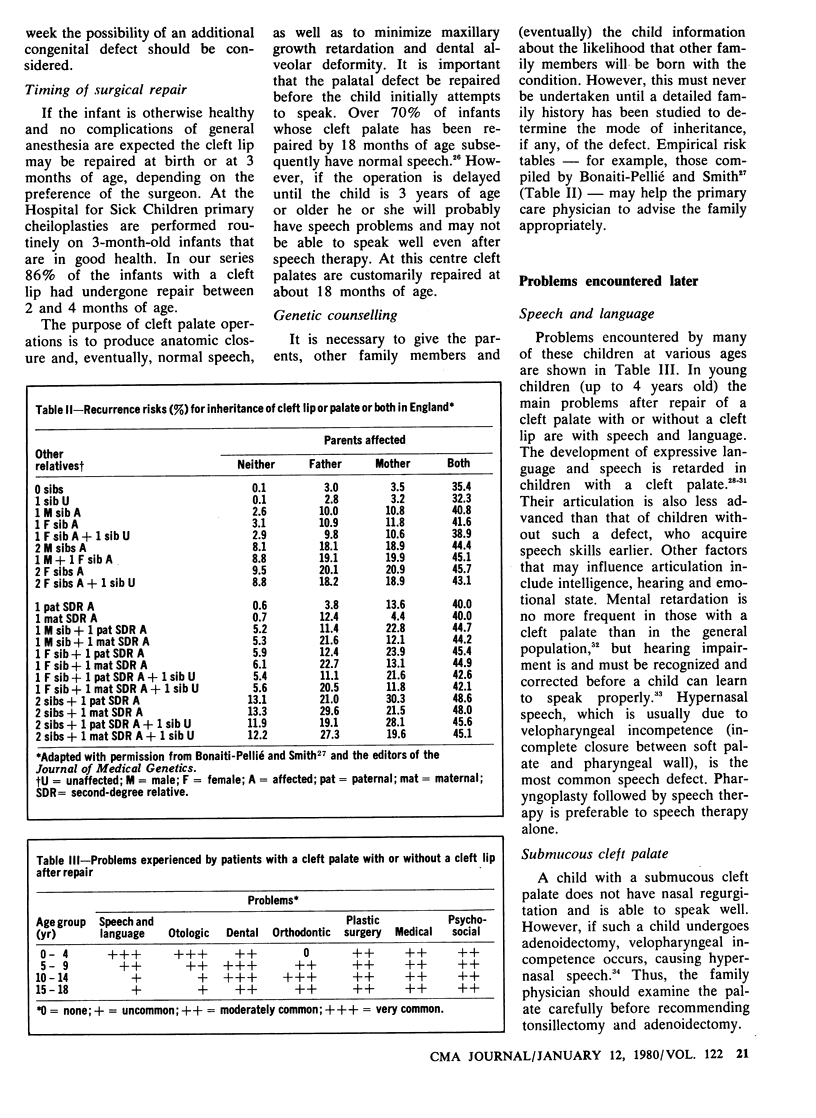
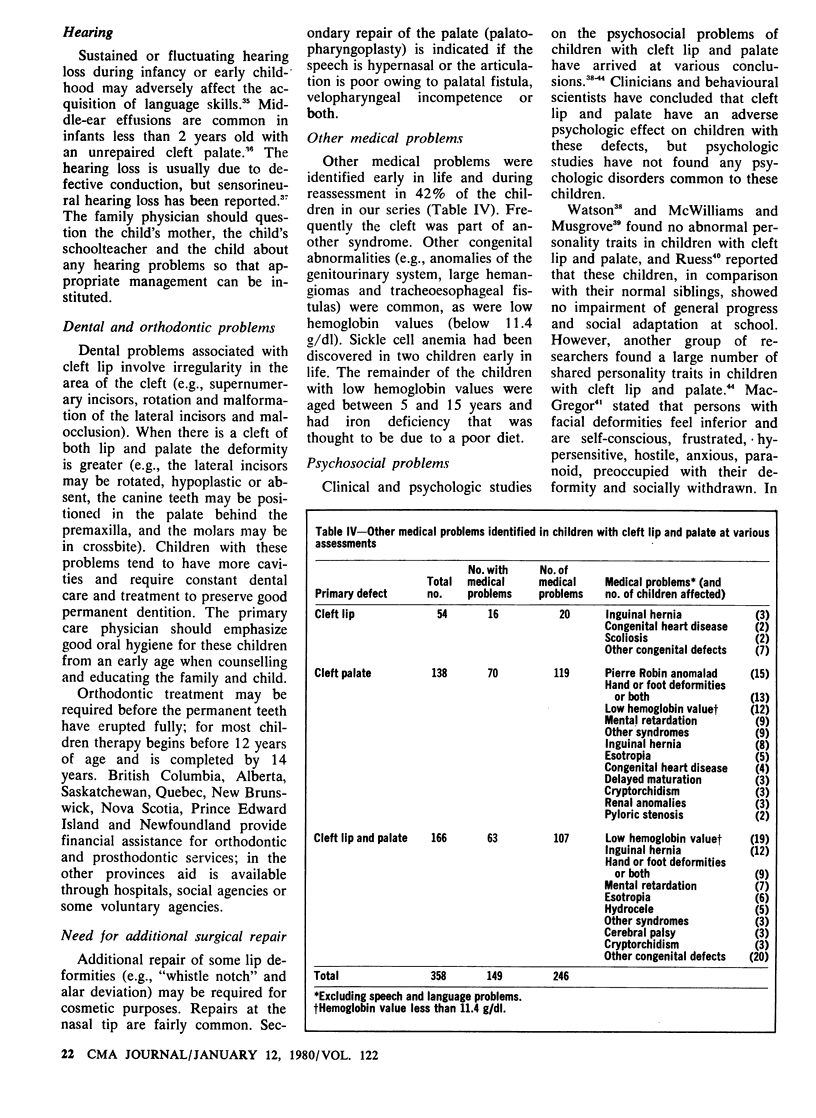
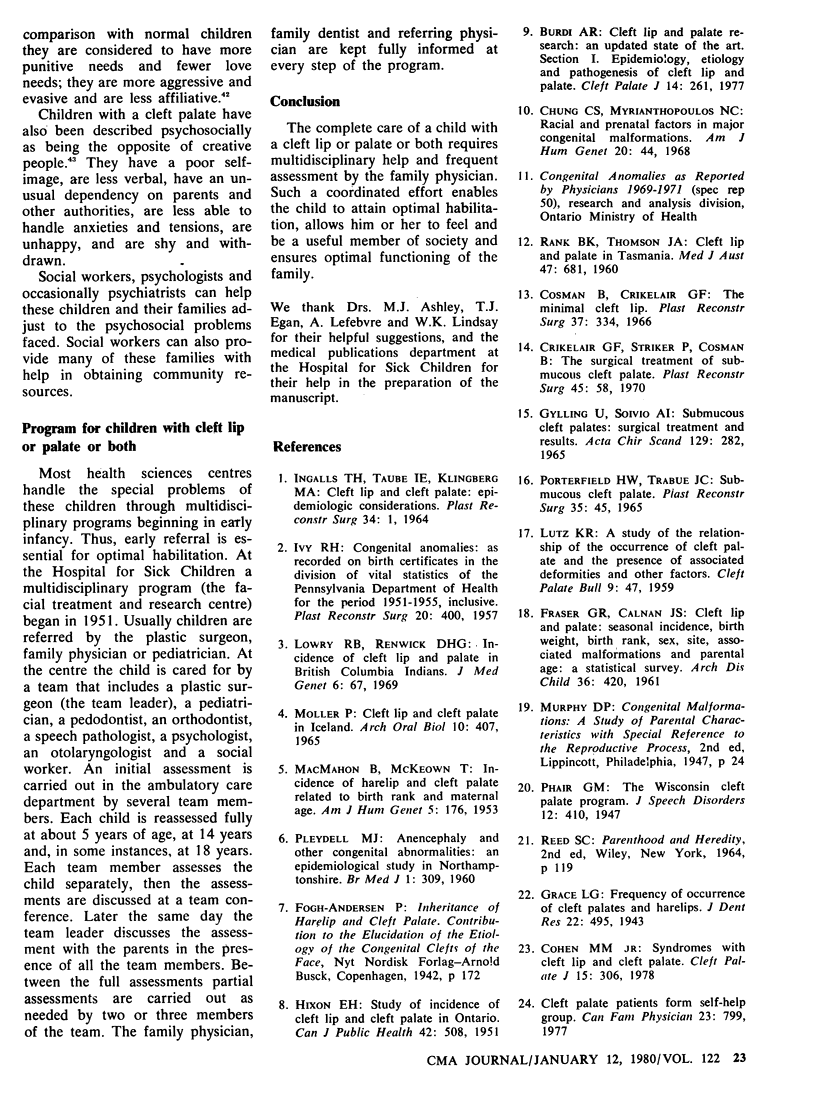
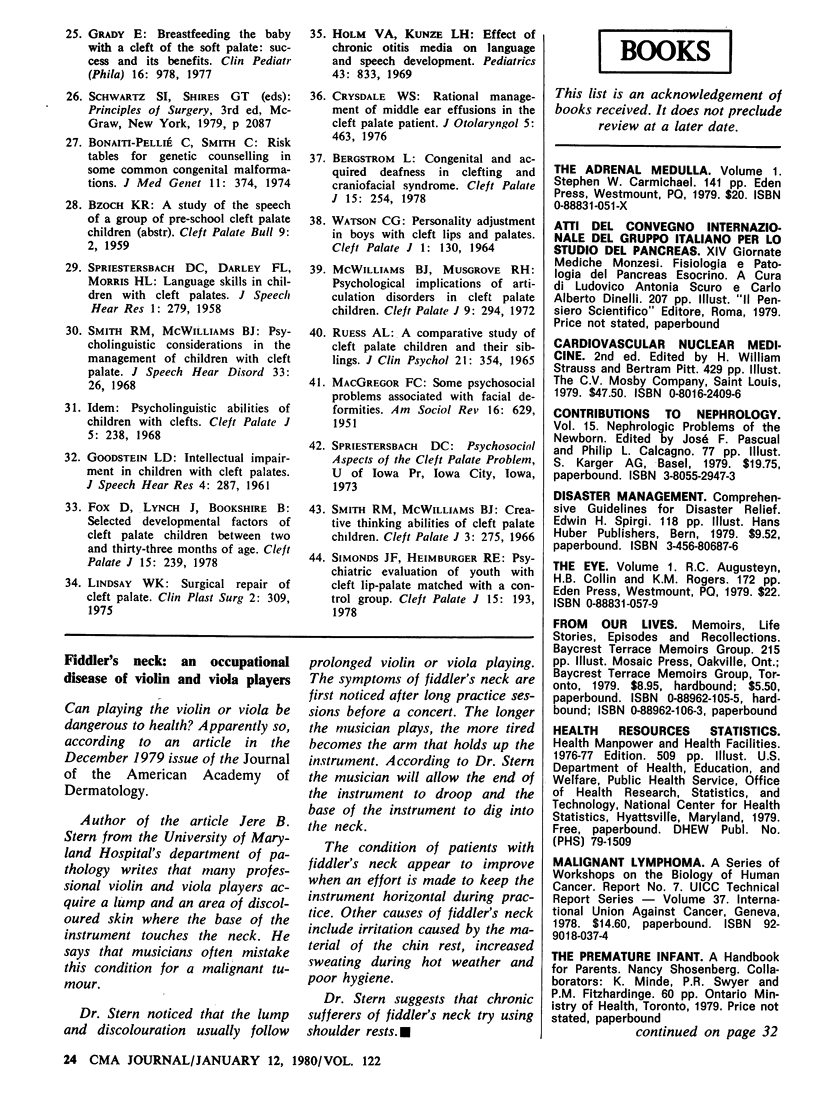
Selected References
These references are in PubMed. This may not be the complete list of references from this article.
- Bergstrom L. Congenital and acquired deafness in clefting and craniofacial syndromes. Cleft Palate J. 1978 Jul;15(3):254–261. [PubMed] [Google Scholar]
- Bonaiti-Pellié C., Smith C. Risk tables for genetic counselling in some common congenital malformations. J Med Genet. 1974 Dec;11(4):374–377. doi: 10.1136/jmg.11.4.374. [DOI] [PMC free article] [PubMed] [Google Scholar]
- Burdi A. R. Cleft lip and palate research: an updated state of the art. Section I. Epidemiology, etiology, and pathogenesis of cleft lip and palate. Cleft Palate J. 1977 Oct;14(4):261–269. [PubMed] [Google Scholar]
- Chung C. S., Myrianthopoulos N. C. Racial and prenatal factors in major congenital malformations. Am J Hum Genet. 1968 Jan;20(1):44–60. [PMC free article] [PubMed] [Google Scholar]
- Cohen M. M., Jr Syndromes with cleft lip and cleft palate. Cleft Palate J. 1978 Oct;15(4):306–328. [PubMed] [Google Scholar]
- Cosman B., Crikelair G. F. The minimal cleft lip. Plast Reconstr Surg. 1966 Apr;37(4):334–340. doi: 10.1097/00006534-196604000-00008. [DOI] [PubMed] [Google Scholar]
- Crikelair G. F., Striker P., Cosman B. The surgical treatment of submucous cleft palate. Plast Reconstr Surg. 1970 Jan;45(1):58–65. doi: 10.1097/00006534-197001000-00008. [DOI] [PubMed] [Google Scholar]
- Crysdale W. S. Rational management of middle ear effusions in the cleft palate patient. J Otolaryngol. 1976 Dec;5(6):463–467. [PubMed] [Google Scholar]
- FRASER G. R., CALNAN J. S. Cleft lip and palate: seasonal incidence, birth weight, birth rank, sex, site, associated malformations and parental age. A statistical survey. Arch Dis Child. 1961 Aug;36:420–423. doi: 10.1136/adc.36.188.420. [DOI] [PMC free article] [PubMed] [Google Scholar]
- Fox D., Lynch J., Brookshire B. Selected developmental factors of cleft palate children between two and thirty-three months of age. Cleft Palate J. 1978 Jul;15(3):239–245. [PubMed] [Google Scholar]
- GOODSTEIN L. D. Intellectual impairment in children with cleft palates. J Speech Hear Res. 1961 Sep;4:287–294. doi: 10.1044/jshr.0403.287. [DOI] [PubMed] [Google Scholar]
- GYLLING U., SOIVIO A. I. SUBMUCOUS CLEFT PALATES. SURGICAL TREATMENT AND RESULTS. Acta Chir Scand. 1965 Mar;129:282–287. [PubMed] [Google Scholar]
- Grady E. Breastfeeding the baby with a cleft of the soft palate: success and its benefits. Clin Pediatr (Phila) 1977 Nov;16(11):978–981. doi: 10.1177/000992287701601102. [DOI] [PubMed] [Google Scholar]
- HIXON E. H. A study of the incidence of cleft lip and cleft palate in Ontario. Can J Public Health. 1951 Dec;42(12):508–511. [PubMed] [Google Scholar]
- Holm V. A., Kunze L. H. Effect of chronic otitis media on language and speech development. Pediatrics. 1969 May;43(5):833–839. [PubMed] [Google Scholar]
- INGALLS T. H., TAUBE I. E., KLINGBERG M. A. CLEFT LIP AND CLEFT PALATE: EPIDEMIOLOGIC CONSIDERATIONS. Plast Reconstr Surg. 1964 Jul;34:1–10. doi: 10.1097/00006534-196407000-00001. [DOI] [PubMed] [Google Scholar]
- IVY R. H. Congenital anomalies; as recorded on birth certificates in the Division of Vital Statistics of the Pennsylvania Department of Health, for the period 1951-1955, inclusive. Plast Reconstr Surg (1946) 1957 Nov;20(5):400–411. [PubMed] [Google Scholar]
- Lindsay W. K. Surgical repair of cleft palate. Clin Plast Surg. 1975 Apr;2(2):309–318. [PubMed] [Google Scholar]
- MACMAHON B., MCKEOWN T. The incidence of harelip and cleft palate related to birth rank and maternal age. Am J Hum Genet. 1953 Jun;5(2):176–183. [PMC free article] [PubMed] [Google Scholar]
- McWilliams B. J., Musgrave R. H. Psychological implications of articulation disorders in cleft palate children. Cleft Palate J. 1972 Oct;9:294–294. [PubMed] [Google Scholar]
- Moller P. Cleft lip and cleft palate in Iceland. Arch Oral Biol. 1965 May-Jun;10(3):407–420. doi: 10.1016/0003-9969(65)90106-8. [DOI] [PubMed] [Google Scholar]
- PLEYDELL M. J. Anencephaly and other congenital abnormalities. An epidemiological study in Northamptonshire. Br Med J. 1960 Jan 30;1(5169):309–315. doi: 10.1136/bmj.1.5169.309. [DOI] [PMC free article] [PubMed] [Google Scholar]
- RANK B. K., THOMSON J. A. Cleft lip and palate in Tasmania. Med J Aust. 1960 Oct 29;47(2):681–689. [PubMed] [Google Scholar]
- Ruess A. L. A comparative study of cleft palate children and their siblings. J Clin Psychol. 1965 Oct;21(4):354–360. doi: 10.1002/1097-4679(196510)21:4<354::aid-jclp2270210403>3.0.co;2-t. [DOI] [PubMed] [Google Scholar]
- SPRIESTERSBACH D. C., DARLEY F. L., MORRIS H. L. Language skills in children with cleft palates. J Speech Hear Res. 1958 Sep;1(3):279–285. doi: 10.1044/jshr.0103.279. [DOI] [PubMed] [Google Scholar]
- Simonds J. F., Heimburger R. E. Psychiatric evaluation of youth with cleft lip-palate matched with a control group. Cleft Palate J. 1978 Jul;15(3):193–201. [PubMed] [Google Scholar]
- Smith R. M., McWilliams B. J. Creative thinking abilities of cleft palate children. Cleft Palate J. 1966 Jul;3:275–283. [PubMed] [Google Scholar]
- Smith R. M., McWilliams B. J. Psycholinguistic considerations in the management of children with cleft palate. J Speech Hear Disord. 1968 Feb;33(1):26–32. doi: 10.1044/jshd.3301.26. [DOI] [PubMed] [Google Scholar]
- WATSON C. G. PERSONALITY ADJUSTMENT IN BOYS WITH CLEFT LIPS AND PALATES. Cleft Palate J. 1964 Jan;16:130–138. [PubMed] [Google Scholar]


